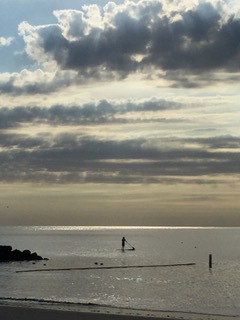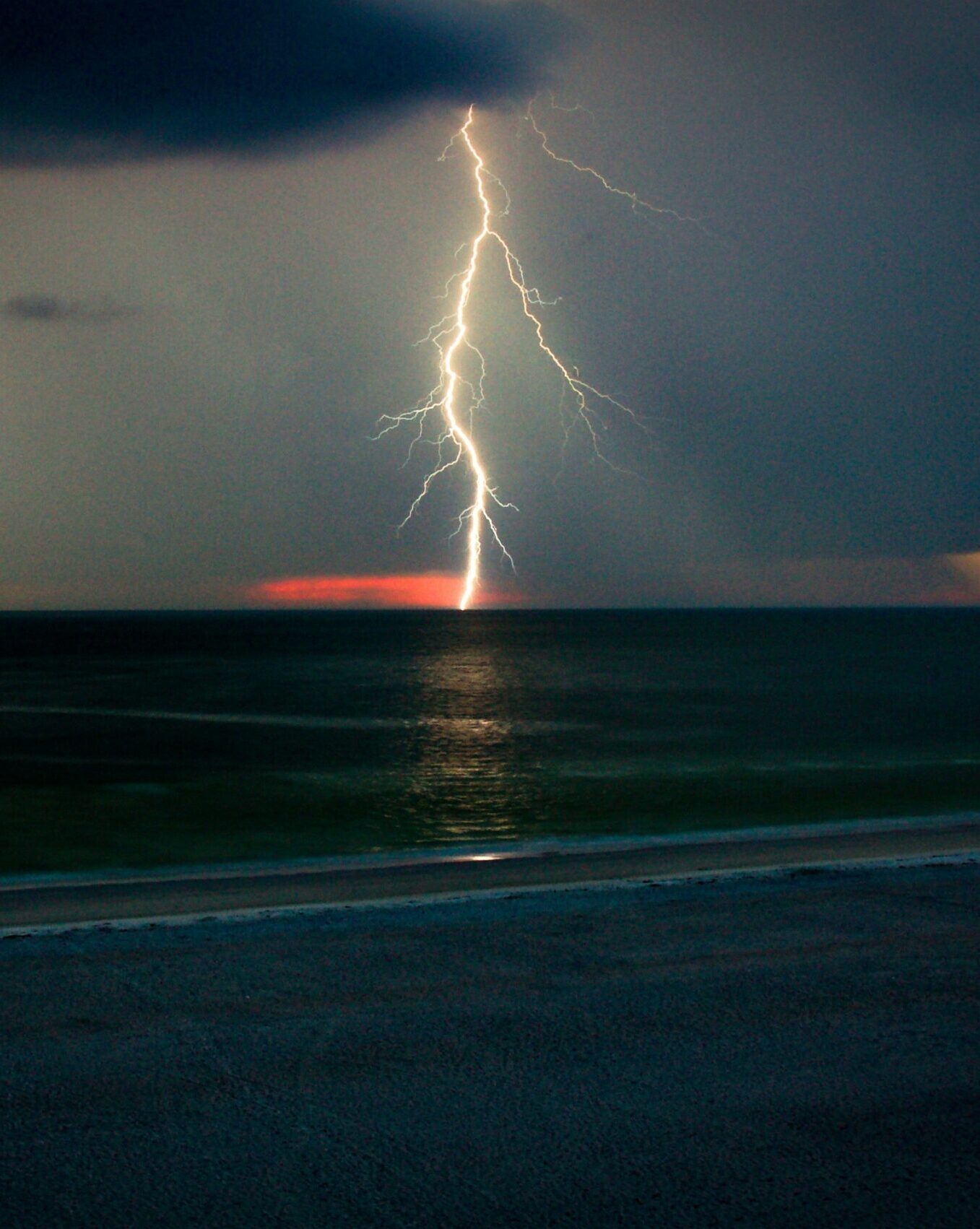
Coastal Virginia
Sunday morning, Buckroe Beach. It’s early, before the kids and kites and coolers. A different crowd is here. Another breed of beach-lover.
A small group of Baptists emerges from the water’s edge. The men, burly and robust, call and jostle in boyish exuberance. The sisters, in flowing white, hover around one woman wrapped in a maroon beach towel like a rescued bird; damp curls cling to her forehead. She is radiant.
Just past the pier, the yoga class that started a few weeks ago has already doubled in size. The backsides of fifty-plus downward-facing dogs in every possible size, shape and color, stretch toward the heavens.
Farther down the beach, past the lifeguard stand, the AA group gathers. Members straggle in, plopping their chairs into a rag-tag circle. There’s back-slapping and hugging and arms raised to the sun as though a large flock had returned to roost. The fluttering settles, they get to work.
My morning walk along a concrete “boardwalk” carries me through this small park at the mouth of the Chesapeake Bay—a watery world of tunnels, bridges, and seven cities dotted with countless beaches, lakes, marshes and swamps. The walk has become a daily practice, in every weather. A constitutional of sorts, but more imperative. The water glitters in early sunlight or glowers under steely clouds. Laughing gulls whirl and scream overhead, their raucous, cascading calls tumble to the beach below. Brown pelicans glide low over the waves, and, on a lucky day, bottlenose dolphins burst the surface. Sometimes I’m joined by a few lone joggers, or a paddleboarder might glide by, tall and erect, her long pole slicing the water, stirring ruffles onto silk.
But Sundays, it seems, everyone brings their cherished and familiar rituals outside in communion with nature. The quotidian, enhanced by exposure to the outdoors.
I understand this concept; it’s deep in my heritage. The Swedes have perfected the art of being outside. In fact, during the long, balmy days of the Swedish summer, every meal is taken al fresco; restaurants even place a blanket on each chair for late evening dining. Church services, meetings, gatherings, everything happens utomhus. Years ago in my mother’s eulogy, I shared her precept for happiness: Why be inside when you can be outside, and why be merely outside when you can be having a picnic? The assembled family and old Swedes all nodded quietly in perfect understanding.
Sometimes I carry a copy of Wendell Berry’s “The Peace of Wild Things” on my walk. A sort of talisman, I guess, for my own healing from a deep distress that overwhelms me when, as Berry says, “despair for the world grows in me.” Porous-ness, my husband and I call it, when I absorb dangerous amounts of the angst of the world, both from my immediate orbit and around the globe. Conversations, television, social media, bumper stickers all become toxic. Other than a ban on all media, the only successful intervention is wild places.
Some people, like Berry, know a single place deeply. They observe the intimate details of a place, and lovingly monitor life, growth and death in their surroundings. The bloom of a flower, an early thaw, the bend of grass in a west wind. Each occurrence is its own story; to witness is to experience its beauty.
I’ve spent much of my life rushing headlong into nature, craving the beauty of it, drinking deeply and then, abruptly, requiring movement and the quest for new sights and experiences. It’s not until I reach a tipping point—some undetermined number of forests, birds, lakes, sunsets, hikes—that I gradually slip into a heightened sense of the present moment that can steel my heart against the stress of the world.
Nature, generously, tolerates both approaches. There’s limitless experience and beauty in both breadth and depth. And limitless opportunity to find it, even where I live, among a million and a half other people. I merely face eastward, toward the sea, and walk. And as Berry reminds me, I pause, and I observe.
Are my fellow Sunday beach-goers finding “the peace of wild things?” Perhaps. I’m not even sure that’s what they’re seeking. But I admire their commitment to participate out-of-doors. We’re not, after all, in the wild—there are pigeons overhead, not falcons, and the black pine and roses lining the boardwalk are lovely, just not tamaracks and trilliums.
But we are in the presence of sky and sand and surf. Here, wedged between city and sea, this sliver of beach is my wild.
Cindy Carlson grew up in the snowbelt of western New York, and, when not traveling and birding with her husband, has spent most of her adult life along the Chesapeake Bay in Virginia. After a long career in youth development, she is enjoying retirement as a writer. A winner of the Hampton Roads Writers contest for creative nonfiction and co-founder of the local chapter of Women Who Submit, her work has appeared in several travel journals, The Wayfarer, Bird’s Thumb, Chautauqua, Tiferet, Barely South Review, and Women Who Submit’s first anthology, Accolades.
Photo by author.




